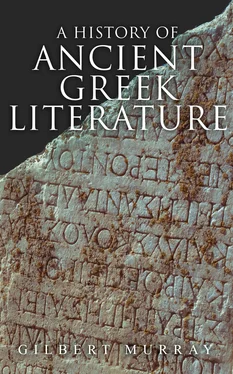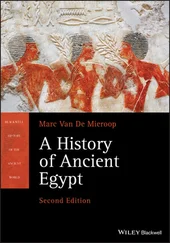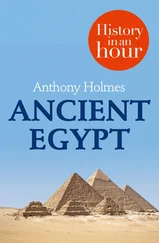Diomêdes, first, has no room in Argos; apart from the difficulty with Agamemnon, he is not in the genealogy, and has to inherit through his mother. A slight study of the local worships shows what he is, an idealised Ætolian. He is the founder of cities 1 in Italy; the constant companion of Odysseus, who represents the North - West islands. He is the son of Tydeus, who ate his enemy's head, and the kinsman of Agrios ('Savage') and the 'sons of Agrios' -- the mere lion-hero of the ferocious tribes of the North-West.
Agamemnon himself comes from the plain of Thessaly. He is king of Argos; only in a few late passages, of Mycenæ. Aristarchus long ago pointed out that 'Pelasgian Argos' in Homer means the plain of Thessaly. But 'horse-rearing Argos' must be the same, for Argos of the Peloponnese was without cavalry even in historical times. And a careful treatment of the word 'Argos' shows its gradual expansion in the poems from the plain of Thessaly to Greece in general, and then its second localisation in the Peloponnese. Agamemnon is the rich king of the plain of Thessaly; that is why he is from the outset connected with Achilles, the poor but valiant chief from the seaward mountains; that is why he chooses Aulis as the place for assembling his fleet.
Aias in the late tradition is the hero of Salamis; but in the poems he has really no fixed home. He is the hero of the seven-fold shield, whose father is 'Shield-strap' (Telamon), and his son, 'Broad-buckler' (Eurysakes); if he has connections, we must look for them in the neigbbourhood of his brother the Locrian, and his father's brother, Phôkos, who, although he was knocked on the head by the sea-shore, and had a mother called 'Sea-sand,' was perhaps originally as much a Phokian as a 'seal'. So far we get a general conception of an original stage of the story in which the chiefs were all from Northern Greece. Where was the fighting?
Achilles and Agamemnon must be original; so must Hector and Ilion; so, above all, must Alexander-Paris and Helenê. But need Ilion be in Troia on the site of Hissarlik? It is worth observing that the scenery of the similes in the oldest parts of the poems is Thessalian, and not Asiatic; that Hector ('Upholder') is not connected in local legend with the historical Troy -- its heroes are Æneas and one Dares; 15that this Æneas, though afterwards identified with a hero at Hissarlik, seems to be in origin the tribal hero of the Æneânes in South Thessaly, just as Teukros ('Hitter'), the archer, gets in later tradition mixed up with Ilion, and the Ilionmen become Teukroi? Of course it is ultimately a myth that we have to deal with. The original battle for Helen was doubtless a strife of light and darkness in the sky, just as the Niblungs were cloud-men and Sigurd a sungod, before they were brought down to Worms and Burgundy. But it looks as if the Helen-feud had its first earthly localisation, not in Troy, but on the southern frontier of those Thessalian bards who sang of it.
When Dr. Schliemann made his first dazzling discoveries at Mycenæ and Hissarlik, he believed that he had identified the corpse of Agamemnon and recovered the actual cup from which Nestor drank, the pigeons still intact upon the handles. We all smile at this now; but it remains a difficult task to see the real relation which subsists between the civilisation described in the Homeric poems, and the great castles and walls, the graves and armour and pottery, which have now been unearthed at so many different sites in Greece.
Of the nine successive cities at Hissarlik, the sixth from the bottom corresponds closely with the civilisation of Mycenæ, a civilisation similar in many respects to that implied in the earliest parts of the Iliad . The Homeric house can be illustrated by the castle of Tiryns; the " cornice of blue kyanos ," a mystery before, is explained by the blue glass-like fragments found at Mycenae. The exhumed graves and the earliest parts of Homer agree in having weapons of bronze and ornaments of iron; they agree substantially in their armour and their works of art, the inlaid daggers and shields, the lion-hunts and bull-hunts by men in chariots, and in the ostensible ignorance of writing.
On the other hand, the similarity only holds good for the earliest strata of the poems, and not fully even for them. Mycenae buried her dead; the men of the epos burnt theirs -- a practice which probably arose during the Sea Migrations, when the wanderers had no safe soil to lay their friends in. Tiryns actually used stone tools to make its bronze weapons, whereas the earliest epos knows of iron tools; and in general we may accept E. Meyer's account that the bloom of the epos lies in a 'middle age' between the Mycenæan and the classical periods.
Thus the general evidence of the subject-matter conspires with that of the language, to show that the oldest strata have been worked over from an Æolic into an Ionic shape; that the later parts were originally composed in Ionia in what then passed as 'Epic' -- that is, in the same dialect as then appeared in the rest of the poems, with an unconsciously stronger tincture of Ionism; further, that the translation was gradual, and that the general development took centuries; and lastly, perhaps, that an all-important epoch in this development was formed by the great Race Migrations which are roughly dated about 1000 B.C. It seems to have been the Migrations that took the legendary war across the sea, when historical Æolians found themselves fighting in the Troad against Hissarlik, and liked to identify their own enemies with those of their ancestors; the Migrations, which drew down the Northern heroes to the Peloponnese, when a stream of Greeks from the Inachus valley met in Asia a stream from Thessaly. The latter contributed their heroic saga; the former brought the memory of the gigantic castles and material splendour of Tiryns and Mycenæ.
These Migrations present a phenomenon common enough in history, yet one which in romantic horror baffles a modern imagination: the vague noise of fighting in the North; the silly human amusement at the troubles of one's old enemies over the border; the rude awakening; the flight of man, woman, and child; the hasty the flinging of life and fortune on unknown waters. The boats of that day were at the mercy of any weather. The ordinary villagers can have had little seamanship. They were lost on the waves in thousands. They descended on strange coasts and died by famine or massacre. At the best, a friendly city would take in the wives and children, while the men set off grimly to seek, through unknown and monster-peopled scas, some spot of clear land to rest their feet upon. Aristarchus put Homer at the 'Ionic Migration.' This must be so far true that the Migrations -- both æolic and Ionic -- stirred depths of inward experience which found outlet by turning a set of ballads into the great epos, by creating ' Homer.' It was from this adventurous exile that Ionia rose; and the bloom of Ionia must have been the bloom of the epos.
As to determining the comparative dates of various parts of the poems, we have already noticed several possible clues. Bronze weapons are earlier than iron, openair altars earlier than temples, leathern armour earlier than metal armour, individual foot-fighting (witness 'swift-footed Achilles') earlier than chariot-fighting, and this again than riding and the employment of columns of infantry. The use of 'Argos' for the plain of Thessaly is earlier than its vague use for Greece, and this than its secondary specialisation in the Peloponnese. But all such clues must be followed with extreme caution. Not only is it always possible for a late poet to use an archaic formula -- even Sophocles can use χαλκòς for a sword -but also the very earliest and most essential episodes have often been worked over and re-embellished down to the latest times. The slaying of Patroclus, for instance, contains some of the latest work in Homer; it was a favourite subject from the very outset, and new bards kept improving' upon it.
Читать дальше












